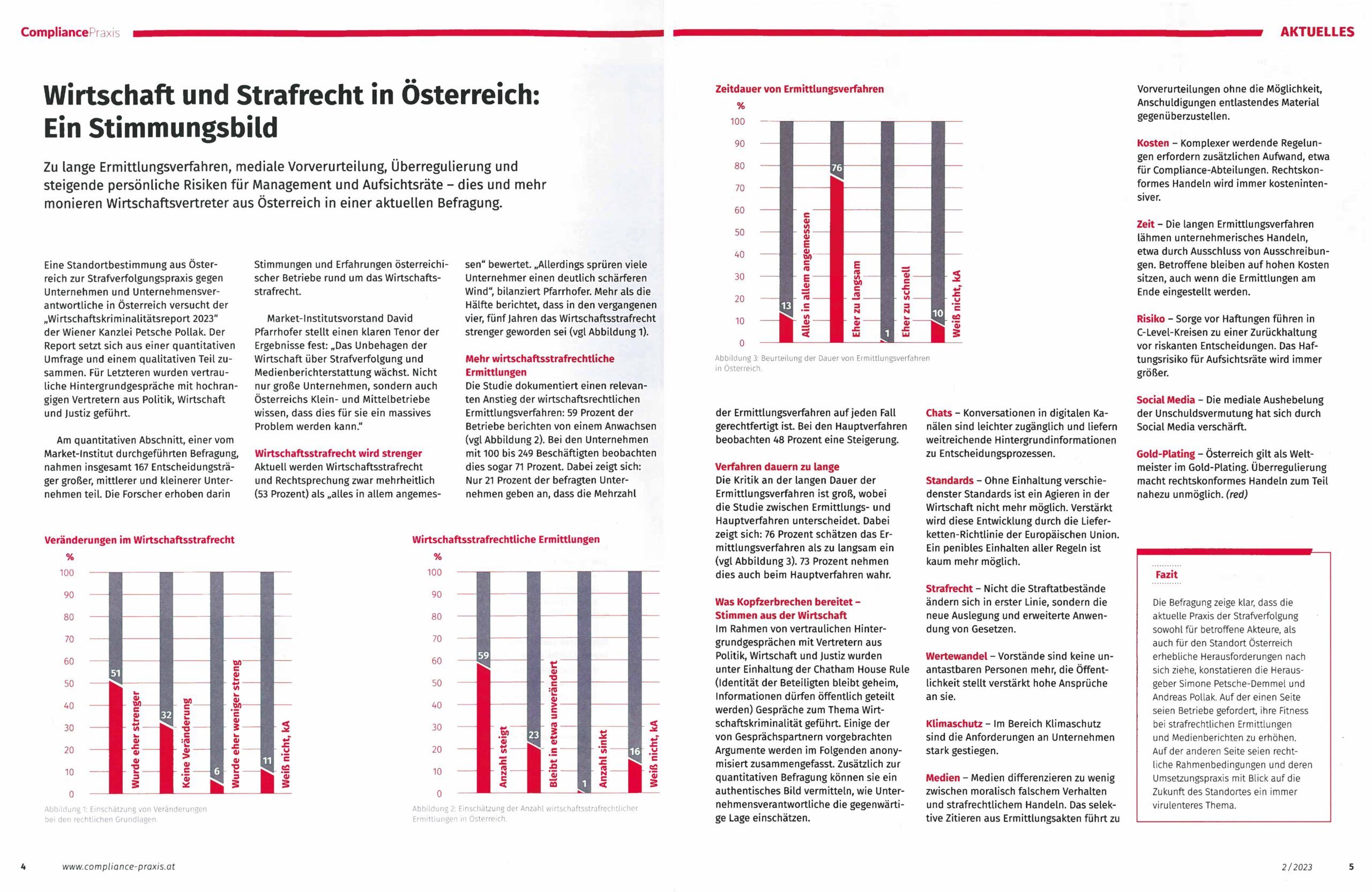Economy and Criminal Law in Austria: A Mood Report
The compliance magazine “Compliance Practice” features a comprehensive report on the Petsche Pollak Economic Crime Report in its current issue. This report provides an overview of the challenges that the current law enforcement practices pose for executives and supervisory boards in Austrian companies.
The risk of criminalizing economic activities is significantly increasing. Our partners and editors of the Economic Crime Report, Simone Petsche-Demmel and Andreas Pollak, along with Dr. David Pfarrhofer, Director of the Market Institute, analyze the impacts on Austria’s economic landscape.
Read the full German report and details.
Here you find the english translation of the report:
Economy and Criminal Law in Austria: A Mood Picture
Too long investigative procedures, media pre-judgment, overregulation, and increasing personal risks for executives and board members – these and more are criticized by business representatives from Austria in a recent survey.
The “Business Crime Report 2023” from the Vienna-based law firm Petsche Pollak attempts to provide an assessment of the law enforcement practices against companies and corporate executives in Austria. The report consists of both a quantitative survey and a qualitative component. The latter involved confidential discussions with senior representatives from politics, business, and the judiciary.
In the quantitative section, a survey conducted by the Market Institute involved a total of 167 decision-makers from large, medium-sized, and smaller companies. In this survey, researchers collected sentiments and experiences of Austrian businesses regarding economic criminal law.
David Pfarrhofer, the head of the Market Institute, notes a clear trend in the results: “The discomfort within the business community regarding law enforcement and media coverage is increasing. Not only large companies but also Austria’s small and medium-sized enterprises are aware that this can become a significant problem for them.”
Economic criminal law is getting stricter
Currently, economic criminal law and jurisprudence are mostly rated as “overall appropriate” by 53 percent. However, Pfarrhofer concludes, “Nevertheless, many entrepreneurs feel a significantly harsher climate.” More than half of them report that economic criminal law has become stricter in the past four to five years.
More economic criminal investigations
The study documents a significant increase in economic criminal investigations: 59 percent of businesses report a growth (see Figure 2). Among companies with 100 to 249 employees, this figure rises to 71 percent. It is worth noting that only 21 percent of the surveyed companies indicate that the majority of the investigative procedures are definitely justified. Regarding major cases, 48 percent report an increase.
Proceedings take too long
Criticism of the lengthy duration of the investigative procedures is significant, with the study distinguishing between investigative and main proceedings. In this regard, it is evident that 76 percent consider the investigative process to be too slow (see Figure 3). Additionally, 73 percent perceive this issue in the main proceedings as well.
What is causing concern – Voices from the business world
As part of confidential background discussions with representatives from politics, business, and the judiciary, conversations on the topic of economic crime were conducted following the Chatham House Rule (identities of participants remain confidential, information can be shared publicly). Some of the arguments put forward by the conversation partners are summarized anonymously below. In addition to the quantitative survey, these insights can provide an authentic perspective on how corporate executives assess the current situation.
Chats – conversations in digital channels – are more readily accessible and provide extensive background information on decision-making processes.
Standards – without adhering to various standards, operating in the business world is no longer feasible. This trend is further reinforced by the European Union’s supply chain directive. It’s increasingly difficult to meticulously comply with all the rules.
Criminal law – It’s not primarily the criminal offenses that change, but rather the new interpretation and expanded application of laws.
Change in values – Executives are no longer untouchable figures; the public increasingly holds them to high standards.
Climate protection – The demands on companies in the field of climate protection have significantly increased.
Media – Media outlets often fail to differentiate between morally wrong behavior and criminal actions. Selective quoting from investigative files leads to pre-judgments without the opportunity to present exculpatory evidence.
Costs – Increasingly complex regulations require additional efforts, especially for compliance departments. Acting in compliance with the law becomes increasingly expensive.
Time – Lengthy investigative procedures hinder entrepreneurial activities, such as exclusion from bidding processes. Those affected are burdened with high costs even if the investigations are eventually dropped.
Risk – Concerns about liabilities lead to caution among C-level executives when making risky decisions. The liability risk for board members is growing.
Social Media – The media’s undermining of the presumption of innocence has been exacerbated by social media.
Gold-Plating – Austria is considered a world champion in gold-plating. Overregulation makes acting in compliance with the law nearly impossible in some cases. (red)
Conclusion
The survey clearly indicates that the current practice of law enforcement poses significant challenges for both affected parties and the location of Austria, according to the publishers Simone Petsche-Demmel and Andreas Pollak. On one hand, businesses are called upon to enhance their fitness when it comes to criminal investigations and media coverage. On the other hand, legal frameworks and their implementation practices with an eye on the future of the location are becoming increasingly pressing issues.

